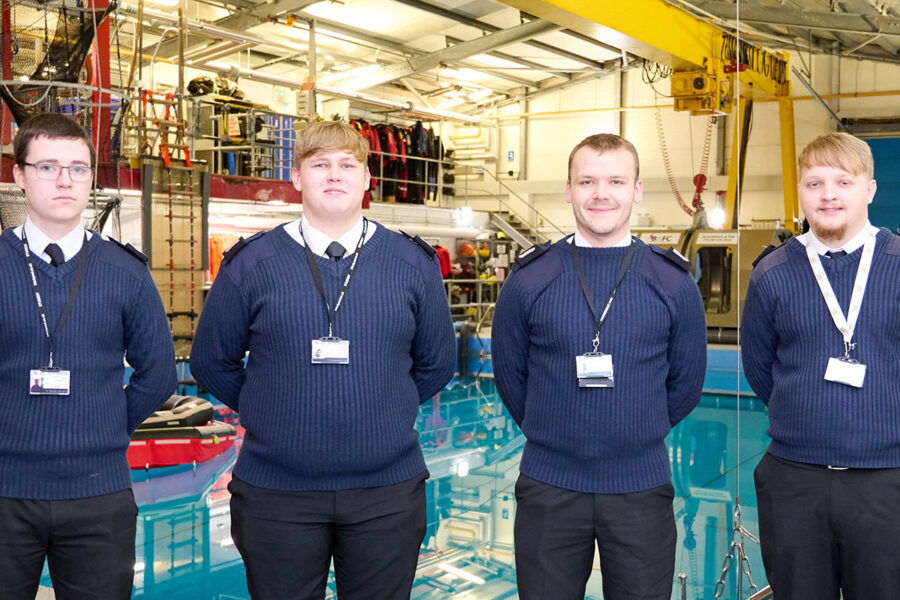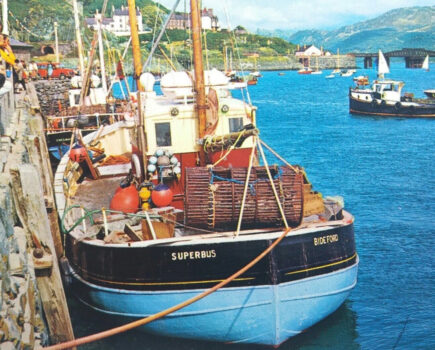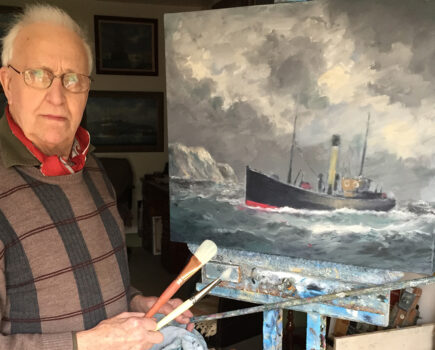The North Atlantic Fishing Company explains the motivation behind its ‘grow your own’ cadet programme
Competing for talent in a buoyant jobs market with an offer that includes demanding work at sea and periods away from home is a challenge. When coupled with the overall uncertainties that surround the fishing industry at present, recruitment and retention become doubly demanding.
To address this challenge, the North Atlantic Fishing Company (NAFCO) has invested in ‘growing its own’ by engaging four engineer officer cadets, to help develop the skills required for fishing now, and into the future.
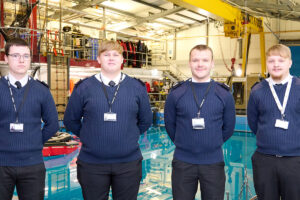
Left to right: NAFC cadets Nathan Whitton, Connor Rawson, Reuben Shotts and Thomas Campbell at the Fleetwood Nautical Campus.
NAFCO owns and operates a fleet of UK-registered vessels including the Frank Bonefaas, Northern Joy and Wirons 5 and 6 – all of which are registered in its home port, Hull. The company is committed to investing in the Humber region, and has established productive partnerships with Hull Sea Cadets and Hull Trinity House Academy, as well as the Blackpool and Fylde Nautical Campus.
All four of the current cadets come from Hull. Thomas Campbell (19), Reuben Shotts (24) and Connor Rawson (20) are enrolled in a Level 3 Diploma course studying marine engineering, while Nathan Whitton (18) is studying for a Foundation Degree in marine engineering.
John Welburn, a highly experienced marine engineer officer, is a key architect of the scheme and has worked closely with the nautical college, Trinity House Academy and the MCA to develop the training programme.
The course combines classroom learning with stints at sea to apply the theory in practice. The students will be eligible to join vessel crews as junior engineer officers upon completion of the programme, performing a watch-keeping duty to ensure the serviceability of all equipment onboard.
Fishermen of the future
The focus for current recruitment is engineering officers. They are in great demand for large, modern fishing vessels where digitalisation and automation are commonplace onboard, alongside the need for traditional skills.
But against the backdrop of a wider STEM (science, technology, engineering and maths) skills shortage, there is a perception that the fishing sector struggles to make itself appealing to young talent.
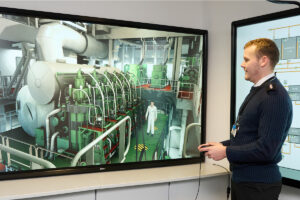
Reuben Shotts in the classroom at Fleetwood.
Indeed, government data reveals that 61% of young people would not consider a maritime career. A possible reason is lack of knowledge or awareness – only 8% had family or close friends working in the marine or fishing industries.
Reuben Shotts is looking towards a career in the fishing industry because of family ties. He said: “My grandparents worked for P&O for 20 years, so I understood the benefits a career at sea could bring from a young age. You never stop learning, and have a brilliant opportunity to see different parts of the world.
“I have always been around boats and ships so have always been interested in the industry, but I don’t think many young people think about a career in fishing. They have preconceived notions of what it will be like, but I know the industry is evolving all the time.
“So far, my experience throughout the cadet sponsorship has been great. There are elements that push you out of your comfort zone, like the adventure training and rock climbing. It’s combined with theoretical practices including physics and maths.
“I have also had the opportunity through this sponsorship to go out to sea on a working vessel as a cadet, which was brilliant. It allows you to experience what life is like working in the fishing industry and what my future career will look like.”
Despite an ageing workforce and limited appeal to many younger people, the seafood industry is continually evolving. The technical expertise of the country’s fishing sector, as with other maritime pursuits, depends heavily on highly skilled labour – a reliance that will only deepen as technology advances.
A limited talent pool ultimately means skill development is limited, which could severely restrict the economic potential of the evolving fishing sector – so providing opportunities for young people to learn more about and pursue maritime and fishing careers is critical.
Connor Rawson was in awe of the tech onboard the first vessel he experienced: “When I got the opportunity to go aboard, the first thing that shocked me was how big everything was. It was fascinating to see how all the systems work, and having seen a few now, I know every ship is different.
“Being at sea was challenging but very rewarding. I didn’t want to get off as I enjoyed it so much – it was great to be away from home, travelling the world.
“I’m keen to tackle the misconceptions about fishing. People assume it is not a safe industry, but there is minimal risk involved in modern fishing as there are extensive safety checks completed every day and the vessels are kept very clean. From the engineering perspective, it is very advanced and fishing vessels have a lot of different machinery and systems.”
“The are some great benefits to working at sea, which I don’t think many people are aware of,” added Thomas Campbell. “Once the days’ work is over, you’re able to sit out on the deck and listen to the sound of the waves, which is very peaceful. You also gain a broader view of other people’s cultures and experiences, both from the different countries you visit whilst out at sea but also the other crew members onboard, as there is always a mix of people from different backgrounds with you.
“Going forward, I would like to gain some more practical experience and then come back to education to get to the next rank onboard a vessel.”
The growing demand for fish in a global market makes it imperative to preserve the fishing sector in the UK, especially the rich fishing heritage of the Humber region. Ensuring future growth requires adequate funding, education, and greater visibility and support of the rewarding careers available in the sector.
Phil Haslam, managing director of NAFCO, said: “From the beginning of my naval career, a mantra that was drummed into all junior officers was ‘the sailor is the single most important factor’. It meant that however modern and sophisticated the technology at sea became, it was only as good as the human operating it and, indeed, the skill of the operator was always the thing that made the difference.
“That is as true today as it was then, and is equally applicable to all seafarers. I adopt the same approach when recruiting, training, supporting and managing the fishermen who work with North Atlantic Fishing Company. Our people are our most important asset, and we need to invest in the next generation.”
This story was taken from the latest issue of Fishing News. For more up-to-date and in-depth reports on the UK and Irish commercial fishing sector, subscribe to Fishing News here or buy the latest single issue for just £3.30 here.

